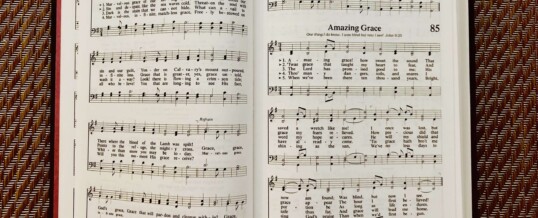
If you’re a Baptist from the South, you’re hoping that the Pearly Gates pop quiz isn’t, “What’s the third verse to any song in the hymnal?”
You won’t know the answer.
If you’re laughing right now, you know exactly what I’m talking about.
In Southern churches that sing the old hymns, skipping the third verse is common.
“OK, let’s all stand. We’ll sing the first, second, and last stanzas,” said the church’s song leader.
In the little church in Ashdown, Arkansas, in which I grew up, if I heard that once, I heard it a thousand times.
I guess, in an effort to squeeze in more songs during the service, song leaders can add one or two extra hymns to the line up by dropping a verse from each song.
But why not sing all of the verses and just have fewer songs? Often, the third verse is part of a story told by all of the verses.
As far as I was concerned, Bethel Missionary Baptist Church was the only one in the world. I knew there were other churches, but I just assumed they were all just like mine. We did everything right, so they must be like mine, right?
I later found out that wasn’t the case, except for not singing the third verse of a hymn. That seemed to be true at many other churches. Methodist and other denominations also skipped stanza number three.
But why? Was brevity the main or only reason?
Some online research on my part made things even more unclear. Turns out, I’m not the only one raising this question for clarification.
Everyone from ministers, to members of theological academia, to bloggers has also asked the question: “Why don’t we sing the third verse?”
So far, working in more songs seems to be the only consistent assumption.
“The Old Rugged Cross,” was written by George Bennard. The third verse (a verse is also called a stanza) has great merit. So why not sing it too?
In the old rugged cross, stained with blood so divine
A wondrous beauty I see;
For ‘twas on that old cross
Jesus suffered and died,
To pardon and sanctify me.
Way back in 1912, James Rowe wrote “Love Lifted Me.” He only wrote three verses, which meant that all of what he wrote would be sung, and forever committed to the memories of millions.
Mr. Rowe may not have known it at the time, but he was smart. All of his lyrics would become immortal, not just all of the verses except one – the third one:
Souls in danger, look above,
Jesus completely saves;
He will lift you by His love
Out of the angry waves.
He’s the Master of the sea,
Billows His will obey;
He your Savior wants to be–
Be saved today.
There were rare occasions where the third verse was sung – sometimes more than once.
During the invitation at the end of the service, when those in the congregation are offered the opportunity to come forward to accept Christ, the song leader might sing from the second verse directly to the third. That was done in case the invitation went exceptionally well. A time when you need that third verse. And the fourth. And possibly all of them again.
If the invitation went really, really well, we’d sing all of the verses a couple of times.
Preachers should list that count on their resumes:
“Accomplishments Include: 36 Invitation Double Sing Throughs, including the third verse.”
The song, “Amazing Grace” is different. It has no chorus, but has six verses. What a missed opportunity to not sing all six verses from what is arguably the best known hymn. The third verse of “Amazing Grace” says:
Through many dangers, toils and snares
I have already come:
’tis grace has brought me safe thus far,
and grace will lead me home.
Today, many churches have focused on more modern music. To reach the younger people, who have to be reached for the church to not only thrive, but also survive, fewer hymns are featured during services.
In many cases, two services provide an opportunity for a traditional service and one that targets the next generation who will steer the church into the future.
The traditional service often features the old hymns, while the modern service may or may not.
But as we move forward, let’s at least try to keep one hymn in each service. Including the third verse. Or in the case of “Amazing Grace,” the third, and also the fifth, and sixth verses.
Keeping the hymns around will teach us what we’ve been missing.
It’s also a good idea just in case there’s a pop quiz later.
©2024 John Moore
John’s books, Puns for Groan People and Write of Passage: A Southerner’s View of Then and Now Vol. 1 and Vol. 2, are available on his website TheCountryWriter.com, where you can also send him a message.
JUL
2024
